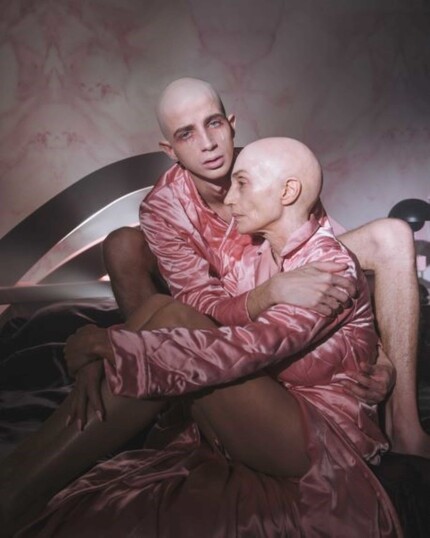
Storming out of the gate like a harrowing, hilarious crossbreed of What Ever Happened to Baby Jane? and Dogtooth, with the sensibilities of John Waters at his most acerbic and the aesthetics of a deranged Wes Anderson, Eduardo Casanova’s sophomore feature La Pietà is a film that will a leave an indelible mark on viewers. Whether that mark is a stamp of approval or a weeping gash is another question entirely, and it very much depends on which one of the two is more appealing to one’s own sense of beauty.
The story of Mateo (Manel Llunell) is that of a young man tethered to his domineering mother, Libertad (Ángela Molina) by a sense of manufactured obligation and dependence. Mateo is a wisp of a man, slender and slight, seemingly frail both at a glance and in constitution, whose mother dictates every move the two of them make. Inside of a sterile, shockingly angular home that Libertad has bathed in soft pink, the two live their lives for one another. Mateo because he knows nothing else, and mother because while she may have cut the physical umbilical that connected them, the emotional cord acts as a leash with which she can control her son and her own environment.
When Mateo accidentally discovers that his long-estranged father is dying and wants to see him, he forces himself to break away from his mother, causing chaos and challenging his own worldview and non-existent autonomy. All of this happens in the middle of aggressive cancer treatments, abortive therapy appointments, mental and emotional collapses from both mother and child, and a disastrous pedicure.
What Casanova has created here is an astonishing visual and aural feat, with the image of Michelangelo’s La Pietà at its center, not only literally, but also the emotional weight of a mother grieving her child. Libertad treats her son not only as though he’s a helpless child, but as a piece of herself, a piece she is loathe to let go, even to bathe alone. It’s no coincidence that Libertad translates to Freedom, a privilege that she affords neither to herself nor Mateo, the irony is blatant, but tragic.
La Pietà is tragicomic to an extreme perhaps only comparable to the best work of Todd Solondz, a high bar that also serves as a kind of reference that will take the temperature of the viewer considering entering Casanova’s absurdist reality. His script is alternately tender and raw, with Molina’s blissfully disconnected performance complementing Casanova’s image of the mother who is so co-dependent on her son that she cannot separate their ailments. There’s a moment in which a cancer diagnosis is received and Libertad cannot seem to disambiguate the victims, it’s played a bit for laughs, but there is genuine pathos in her delivery.
Llunell, on the other hand, displays an uncommon ability to deliver a performance that is both powerful and entirely subservient and subdued. So used to deferring to his mother is Mateo, that his lifeless skin pales in comparison to the garish pink décor of his surroundings. Even when his world starts to collapse, he cannot muster the strength for much more that a single bellow of pain, but that bellow is enough to shatter the manufactured perfection of both his surroundings and the audience who have been conditioned to his silence.
There is a lot going on here, including an extended metaphor comparing the relationship between mother and child with the long-term mass psychosis between Kim Jong-il and the North Korean people, and the comparison is apt. It’s a combination of co-dependent Stockholm syndrome compounded with Munchausen syndrome by proxy that shouldn’t be funny, but is brilliantly written black comedy within a world of pink pastels. Sadly, we were informed that much of the North Korean imagery will have to be altered after this screening due to conservative forces, but it’s so powerful that I don’t believe it will hinder the message much. However, as a fan and advocate of artistic freedom as long as no one gets hurt, it seems like a silly line to draw. To Casanova’s credit, he’s not a fan of the changes either, and the film stands on its own.
Though there are numerous direct lines one can draw from La Pietà to its influences – many of which I’ve tried to include here – I’ve still never seen an assemblage of ideas and images quite like it. It is a singular, painstakingly articulated vision, a contrast of beauty and horror on the level of Divine in Female Trouble, but even more emotionally resonant. Casanova and his cast have done something tremendous here, creating a work in which decay is obvious, but not evident; where relationships are recognizable, but ridiculous; and where inner pain is drawn on the body in ways we haven’t seen before. It’s gorgeously vulgar and shocking, a film that draws from many to create something absolutely unique. Casanova is building worlds of his own, and while you may not want to live within them, there’s nothing quite like the trip.

"vulgar" - Google News
July 22, 2022 at 11:20PM
https://ift.tt/FQiXCyM
Fantasia 2022 Review: LA PIETÀ, A Stunningly Vulgar Triumph In Puke Pink Pastels - ScreenAnarchy
"vulgar" - Google News
https://ift.tt/XKYUDcL
Bagikan Berita Ini














0 Response to "Fantasia 2022 Review: LA PIETÀ, A Stunningly Vulgar Triumph In Puke Pink Pastels - ScreenAnarchy"
Post a Comment